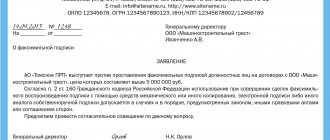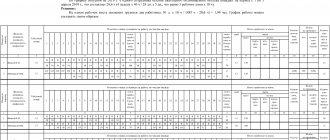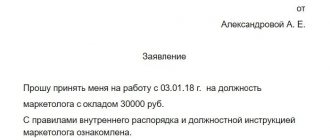Why do you need an explanatory note?
An explanatory note is a document that, in accordance with Art. 193 of the Labor Code of the Russian Federation, the employer must ask the subordinate before imposing a disciplinary sanction on him in the form of a reprimand, reprimand or dismissal. The employee must provide an explanation to the employer within 2 days from the date of request.
The concept of “lateness” is not directly disclosed in the Labor Code of the Russian Federation. However, it may well be qualified as a violation by the employee of his duties and serve as a reason for disciplinary action, since in accordance with the provisions of Art. 189 of the Labor Code of the Russian Federation, the employee’s responsibility is to comply with internal regulations, which, in particular, fix the work schedule.
The essence of an explanatory note about being late for work is to familiarize the employer with the reasons that led to the employee committing an offense.
The provision of an explanatory note in itself does not guarantee the subsequent release of the employee from the disciplinary sanction provided for by the Labor Code of the Russian Federation. But the employer is obliged to take into account the facts that are set out in it in order to assess the proportionality of the offense and the disciplinary measures subsequently applied. The employee may not provide the employer with an explanation, but in this case the company has the right to apply disciplinary action to him.
What legal acts regulate penalties for lateness?
In labor relations, experts consider being late for work to be a legal conflict - regulatory documents recognize a disciplinary event, the employer is recognized with the right to apply disciplinary sanctions for being late and their gradation is established (Article 192 of the Labor Code of the Russian Federation). But at the same time, the Labor Code, as the main regulatory legislative act, does not provide a specific definition of lateness.
The law defines the application of penalties for being late, which is and remains one of the most common types of violation of labor discipline, as a right, but not as an obligation of a manager. In this regard, the procedure for applying penalties for such a violation falls within the scope of local regulations, in this case – the Internal Regulations (IRR), approved at each specific enterprise.
Important! To avoid the possibility of labor disputes, employers are recommended to fully cover the issue of being late for work as a fact of violation of labor discipline, and be sure to include in the temporary work permit:
- definition of late. Its wording may be as follows: “An employee’s arrival at the workplace later than the time established by the Internal Rules as the beginning of the working day is considered late”;
- the main aspects of delay are duration, consistency, and the possibility of confirming the reasons that caused it. Taking into account this data, the employer has the right to determine the degree of punishment, and when to apply the most severe of them - dismissal;
- a clause stating that in each case the employee must submit an explanatory note to the employer about being late for work. The law recognizes the right of a latecomer to refuse to write an explanatory note; however, by applying for a job and signing the acquaintance with the terms of the temporary residence permit, the employee recognizes the primacy of this requirement and is obliged to fulfill it;
- Each case of lateness must be considered individually, and the TRP can provide an indicative list of reasons that can be considered valid. The list should indicate the conditions that, in the employer’s opinion, may serve as grounds for non-application or mitigation of the applicable penalty for a disciplinary violation, for example:
sudden illness of a loved one, requiring immediate delivery to a medical facility,
- a sharp deterioration in the employee’s health;
- an emergency or natural disaster that prevented the employee from arriving at work on time;
- domestic emergencies that threaten the life and property of others and require the presence of an employee for their immediate elimination;
- involvement of law enforcement officers to take part as witnesses in procedural actions;
- traffic accidents involving a latecomer;
- delay of transport used by an employee to get to work.
Explanatory note for being late: document structure
What an explanatory note should look like is not regulated by the Labor Code of the Russian Federation or other federal regulations. But if you follow business practice, you can draw up a document with the following structure:
- Date of preparation;
- title - “Explanatory note”;
- information about the originator of the note and to whom it is addressed;
- a text block with explanations regarding the offense;
- FULL NAME. and the employee's signature.
In the upper left part of the document you can indicate the name of the structural unit in which the note writer works. Information about the recipient (full name and position of manager) is recorded in the upper right part of the document.
Below in the center is the title of the document. Preferably in capital letters, font 2-4 sizes larger than the main one.
The next element of the explanatory note is a text block explaining the reasons for being late. It can rightfully be considered the most important, because it is he who determines what the employer’s reaction to the misconduct will be.
Design rules
The legislation does not provide for a specific form of this document. Therefore, it is written in any form , but taking into account all the norms of business correspondence. The following necessary sections can be distinguished in the explanatory note:
- Document header.
- Title.
- Main text.
- Date and personal autograph of the compiler.
This part of the letter is located in the upper right corner and consists of four sentences, each of which is written on a red line. First there is an indication in whose name the document was drawn up, after the full name of the person, in the third line the position of the person from whom the note is being submitted is indicated, and in the last line - the full name of the originator.
The title is located in the center of the line. It can be written in all capital letters, or begin with a capital letter and continue with lowercase letters. In these cases, there is no dot in the heading line. If the name is written entirely in lowercase letters, then it, together with the header, forms a syntactic unity according to the rules of the Russian language and there should already be a period at the end of the sentence.
It is written in free form . It is advisable to indicate all data as accurately as possible, indicating the date, time and other data if the context requires it. Non-normative vocabulary, the use of colloquial words or jargons will not be appropriate here.
The date is placed in the lower left corner . The signature with the transcript is written opposite the date in the lower right corner.
How to write an explanatory text?
The explanatory note should reflect:
- the exact dates and times of the employee’s actions to which he refers, the events in which he participated;
- reasons that directly predetermined being late for work.
When writing a note, you should adhere to a formal business style.
Regarding the first point, it is recommended to clearly write that we are talking about being late, as well as for what period of time relative to the work schedule. You should not write phrases like “showed up for work a little later than usual.”
When talking about the reasons recorded in the explanatory note about being late for work , it is advisable to let the employer see the root of the problem. The fact that a person overslept can be due to a variety of reasons. The fact that there was construction work going on outside all night and it was very noisy is one thing; participating in a gaming tournament on the Internet until the morning is completely different.
Examples
Late for work
The hardest thing for any person is to admit their own mistakes. Many people are late because they overslept . In this case, you should not come up with excuses, especially if you cannot back them up with facts.
However, you can encourage management to understand by mentioning your previous achievements. An example of an explanatory note would look like this:
General Director Mamontova O.A. from the regional representative Lykhin Ivan Andreevich
Explanatory letter
I, Ivan Andreevich Lykhin, arrived at my workplace on October 10, 2016, two hours late due to oversleeping. I ask management to take into account the fact that during the three years of service in the company, I always came to work on time, regularly performed my work duties, and in the future I undertake to observe labor discipline.
10.10.2016 /__________________/
Lykhin Ivan Andreevich
Absence from work
If you were absent from work, there must be good reasons . Otherwise, the employer has the right to reprimand or reprimand you. Regarding what prevented you from being present at work, you should indicate in the explanatory note:
To the store director Anna Lvovna Kirillova from the seller Natalya Arkadyevna Kuznetsova
Explanatory letter
I, Kuznetsova Natalya Arkadyevna, on June 10, 2020, was absent from my workplace from 14:00 to 16:00. Exactly at 13:00 I went out for lunch at the cafe across the street during my lunch break. When I was returning back, there was an accident at the bus stop. The car collided with the bus, as a result of which the girl was injured. Because I witnessed an accident, and the police officers who arrived at the scene asked me to give a statement. A certificate of testimony is attached.
06/10/2016 /__________________/
Kuznetsova Natalya Arkadyevna
Skipping a school day
Discipline exists not only at work, but also in educational institutions.
Absenteeism can result in expulsion from the university, so in case of absence from studies, it is also necessary to explain the situation in writing and present the situation plausibly.
To the Dean of the Faculty of Foreign Languages, Igor Grigorievich Bashmakov, from a 3rd year student of group No. 1210, Agrippina Nikolaevna Avdeeva
Explanatory letter
I, Avdeeva Agrippina Nikolaevna, missed a day of classes on April 9, 2020 (4 classes and one practical lesson) due to family circumstances. On April 7, my mother arrived from my hometown of Pervouralsk. The fact is that my mother undergoes an annual examination at the clinic for health reasons. On April 9, my mother suddenly became ill, and I called an ambulance. The doctor said that it was better for her to stay at home and put everything aside. I decided to skip classes that day and take care of my mother. The emergency room doctor wrote me a note saying she needed care. I'm attaching a note.
04/09/2016 /__________________/
Avdeeva Agrippina Nikolaevna
Absenteeism from work
If a working day is missed without a valid reason, the employer has the right to dismiss the employee. When presenting events in writing, it is advisable to support your words with facts, certificates from the institutions where you were, and any photo or video recordings.
To the sales director of Majesta LLC, Alisa Lvovna Artemyeva, from the sales manager, Lyubov Nikolaevna Isakova
Explanatory letter
I, Lyubov Nikolaevna Isakova, missed a day of work on November 14, 2020 due to circumstances beyond my control. As usual, I was going to work in the morning by public transport - minibus No. 122. At the Lenin-Bolshakov intersection, our minibus got into an accident, which is why I was taken to the hospital with a slight injury to my arm. I spent in the hospital until 15:00, and then gave evidence to traffic police officers. At 16:30 there was no point in going to work anymore, because... I would get there just in time for the end of the working day. I am attaching certificates from the hospital and from traffic police officers.
November 14, 2016 /__________________/
Isakova Lyubov Nikolaevna
What is the optimal length of an explanatory note?
There are different points of view regarding the volume of the explanatory text block. Some believe that the document should state as briefly as possible the facts relevant to the offense. However, there are those who believe that the employee should disclose information about the reasons for being late in as much detail as possible so that the employer can make an unambiguous decision about whether it is worth applying disciplinary action or whether it is possible to get by with an oral suggestion, or even recognize the reason for being late as valid.
It is fair to believe that everything depends on the specific situation. For example, if an employee was late for work because he missed the bus, metro or train, it is appropriate to explain exactly why this happened. The reasons for being late due to the fact that the door lock in the apartment was jammed and because the alarm clock was not set differ in terms of assessment of respect, although they led to the same result. Therefore, in this case, it makes sense to detail the story.
In turn, if the bus simply did not reach the line on schedule, special details will probably not be needed here - an indication of the very fact that the transport schedule was violated will be sufficient. But in this case the employer will probably want to ensure that this was indeed the case. In this regard, the employee may have to accompany the explanatory note with additional sources confirming the stated facts.
What can they be and how should they be provided to the employer?
Compilation deadline
The legislation stipulates that the employer is obliged to notify the employee of a written explanation of the situation with a special requirement. This document is drawn up immediately after the discovery of any misconduct by the employee.
The requirement is signed by the head of the enterprise or a person authorized by the order for the enterprise, indicating the date and gives the employee the right
to explain the reasons for the misconduct.
The employee has two working days from the date of request to write an explanatory note. It is worth noting that the employee may refuse to provide a written explanation of the situation. This fact does not in any way affect management’s decision to reprimand, reprimand, or even fire an employee for his misconduct.
Additional documents confirming a valid reason for being late
To confirm that the reason for being late is valid, the employee can attach additional documents to the note directly with the note “I am attaching the following documents.” Or you need to refer to the possibility of providing them at any time at the request of the employer. A similar document could be a receipt with a fine issued by a traffic police officer who stopped a person who was late for work for a violation (the employee had to spend time filing the appropriate penalty).
The evidence base in this case can also be electronic sources, for example, video recording on a phone, broadcast from public web cameras or news reports, if the reason for the delay is related to a delay or failure of the vehicle to arrive on schedule due to bad weather. It may also be appropriate to post the relevant content on a cloud service and include a link to download or view it in the explanatory note.
Reasons for being late for work
( Video : “TOP 10 reasons for being late for work”)
According to statistical studies, five main reasons for being late have been identified, which are classic and most common. Considering that the HR officer, like any employee, visits different sites and knows what excuses violators of discipline resort to, it is advisable to write the truth when filling out explanations about being late.
So, let’s look at the TOP 5 reasons for lateness most often found in written explanations:
- Family circumstances
- Public transport failed
- The alarm clock is broken
- Personal car breakdown
- Traffic jams
- Lateness due to family reasons
The most common reason for being late, which is used when being late, is a pipeline leak, neighbors flooded with water, or getting stuck in an elevator. This circumstance can be used rarely. Although it happens that careless neighbors organize floods with enviable stability. Therefore, despite understanding the situation, the manager will not be able to constantly “enter the position of a latecomer” and sooner or later will issue a penalty. If this happens frequently, then you need to deal with your neighbors through the courts.
- Delays due to transport
Disruption of public transport schedules is also a common and realistic reason for being late. But this method of justification also cannot be abused, since if deception is revealed (and it is not so difficult to verify), then the punishment will be appropriate. If you manage to persuade the driver, ask him to write a note about the fact of the breakdown.
- Overslept
Oh, the alarm clock is broken - it can also go off once. And then, not every leader will react to this with sympathy. Naturally, if this is true, then it’s a shame that the mechanism failed, but today, with the availability of many modern mobile devices that can be set up as an alarm clock, it’s unlikely to believe a latecomer.
- Car breakdown
The breakdown of a personal car is a fairly real reason that can be cited. Usually, in such cases, you can warn management about the reason for being late by calling a mobile phone. In such a situation, you can get by with a written explanation.
- Traffic jams
Traffic congestion is the most common reason for workers being late in big cities. However, today, the authenticity of such information can be verified from news reports. If you get caught cheating, you can get into huge trouble.
What happens to an employee for being late?
According to the Labor Code of the Russian Federation, the head of an institution has the right to apply the following disciplinary sanctions:
- Comment
- Rebuke
- severe reprimand
If an employee is repeatedly late for work, or is absent from work for more than 3 hours, the manager may fire him from work. In the second case, the employee may be fired for absenteeism, which is recorded in the work book with the display of Art. 33 Labor Code of the Russian Federation.
A written explanation of lateness is drawn up in a free style. At the same time, the legislation does not allow the use of fines or salary reductions. The only punishment for such a violation is deprivation of the bonus. Therefore, in order to avoid punishment, you must provide valid reasons.
How is the receipt of the explanatory note verified by the employer?
It is advisable to document the fact that the explanatory note was received by the employer - this is in the interests of both parties to the employment contract. The Labor Code of the Russian Federation only says that the employer should record by drawing up an appropriate act the fact of failure to submit an explanatory note. But, as practice shows, following this norm may not be sufficient.
For the employer, receipt of an explanatory note is confirmed by its actual presence. The main thing is that it is not lost: if an employee decides to prove in court or to the Labor Inspectorate that the reason for his lateness is valid, the employer must be able to present the relevant document to the court. If it gets lost, you can request a new one only if no more than a month has passed since the delay occurred (paragraph 3 of Article 193 of the Labor Code of the Russian Federation).
As for the employee, it is important for him to be sure that the employer will not subsequently draw up an unlawful act of failure to provide an explanatory note, pretending that he did not receive it. Therefore, when transferring this document to the personnel service, the employee should ask the secretary or personnel officer to make a copy and put a mark of receipt on it.
Another option is to include an additional element in the structure of the explanatory note - a block with the wording “Received”, “Accepted” or “The document has been reviewed” indicating the full name. and the position of the employee who accepted the document. In this case, the explanatory note should be printed out in 2 copies, after which the signatures of the employee and the personnel department should be affixed to each of them.
Responsibility for refusal of explanatory note
The employee's guilt must be proven.
Despite the need to write an explanatory note, an employee may refuse to provide explanations on a particular issue. However, you should always remember that such a refusal may entail a legitimate attitude from your boss.
In Russian practice, silence is most often perceived as confirmation of guilt. Accordingly, if the employee does not give any explanation, then the manager can evaluate this action in his own way.
You can notify the employer of your refusal to provide explanations either simply orally or in writing. The employee is not required to explain the reason for silence.
Even if a crime has been committed at the enterprise, the employee is obliged to give explanations and comments only to the authorities. Moreover, this can be done both in the presence of a lawyer and without him.
Thus, the boss may demand that an explanatory note be written about what happened, but he does not have the right to force the employee to write a document without fail.
Results
An explanatory note about being late is an official document that is significant for both parties to the employment contract. By providing it, the employee gets a chance to avoid disciplinary action if the lateness was caused by valid reasons and they could be convincingly stated in the document. Failure to provide an explanatory note gives the employer the full right to impose a disciplinary sanction on the employee. It is important for the employee to make sure that the structure of the explanatory note is correct, and also to make sure that the employer has accepted it and that this has been documented.
For an employer, obtaining an explanatory note is important, firstly, because requesting it is an obligation prescribed in the Labor Code of the Russian Federation, and secondly, to maintain labor discipline in the team (a person who was once required to write a corresponding document will most likely try not to give reasons for receiving such orders again).
You can familiarize yourself with other documents used in personnel document flow in the articles:
- “How to write a report (rules, form, sample)?”;
- “Personnel documents that should be in the organization.”
You can find more complete information on the topic in ConsultantPlus. Full and free access to the system for 2 days.
Being late: concept and main reasons
Lateness is considered to be arriving at work later than the scheduled time. Interval: from one minute to 4 hours in a row, after that it’s time to skip.
An explanatory document is a type of official document, which, although drawn up in any form, should still be adhered to in a business style. The recommendation is conditional. Of course, a lawyer, journalist or other talkative specialist will easily and beautifully describe the compelling reasons for their action. But you can hardly expect such verbal outpourings from a carpenter, turner or driver. And everyone is late.
The delay may go unnoticed, then there will be no need to explain. But if an employee of a budget organization is caught, there are two working days for excuses. This is exactly the period established by Art. 193 Labor Code of the Russian Federation.
From practice, we can highlight the main reasons why people are delayed:
- traffic jams;
- health problems;
- water pipe break;
- car breakdown;
- the door lock is broken;
- stopped by traffic cops;
- the alarm did not go off;
- detained at school or kindergarten.
It is clear that employees can lie, therefore, in addition to stating the reason, the employer has the right to demand documentary evidence of what happened.
What else you should know
It’s good if the attendance of employees of a budget organization is recorded automatically - using electronic passes. But technical devices are not available everywhere, so more often the time of untimely attendance is recorded in an act. If the employee denies the obvious, such an act will serve as the only evidence of a violation. It is important to formalize it correctly so that later there are no grounds for canceling the applied disciplinary sanction.
It is also necessary to keep in mind that the employee has the right to refuse to give explanations. In order to bring him to disciplinary liability in this case, it is necessary to give him a written Order to give explanations. From the moment of its delivery, the two-day period begins to count.
He didn’t come to work on time, was delayed due to traffic jams, or missed a minibus or train. All these employee actions ultimately end in the same thing - disciplinary action. True, the owner or director has time to think it over carefully and punish or refuse to punish the employee.
A well-drafted explanatory note for being late will help you avoid severe punishment and unreasonable fines. However, for this the latecomer will have to work hard. In turn, the personnel service of the enterprise is obliged to carefully check the reality of the circumstances specified in the document and determine to what extent the employee’s arguments can be trusted.
Our articles talk about typical ways to resolve legal issues, but each case is unique. If you want to find out how to solve your specific problem, please contact the online consultant form on the right →
It's fast and free!
Or call us by phone (24/7):
If you want to find out how to solve your particular problem, call us by phone. It's fast and free!
Read more: Is it possible to send alcohol by transport company?









